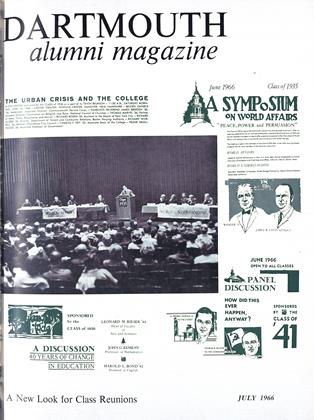THE commencement ceremony in which we are participating today has a dual aspect. We are forced to envision the future while at the same time we are surrounded by objects of the past. The significance of commencement as a beginning lies in the added responsibility inherent in increased understanding. The attainment of one goal necessitates the formation of and the direction towards new objectives. Clearly, the distinction with which we are honored today carries with it a heavy burden of responsibility. I must decline, however, to discuss these future objectives with you today; I feel no great certainty about my own goals and objectives, nor with my own ability to meet the tests placed upon my sense of responsibility, justice, and truth. On this occasion, the culmination of four years of work and struggle, I will rather direct a few thoughts to the past.
If these commencement exercises are in some sense a beginning, they are even more directly an end. For those who will remain here, commencement marks the end of the present academic year, and for those who will graduate, the end of their college careers. And if graduation serves to crystallize thoughts of the future, it also serves to focus and clarify the significance of these past college years.
Dartmouth was here before September 1962, when we arrived in Hanover with our pea-green beanies, and it will be here long after this day when we graduate. Reflecting upon the intervening years, it is quite clear that the Dartmouth we have experienced is at a critical stage in its history. Perhaps future generations of Dartmouth men will look back on the Class of 1966 as a class of transition, for surely, in our four years of attendance, the College has changed greatly. No aspect has remained untouched. Facilities have been expanded and improved with the construction of the Hopkins Center, the Lever one Field House, the Alumni Swimming Pool, and more recently, the Kiewit Computation Center. Recognizing the increasing maturity and intellectual capabilities of the student body, the faculty has instituted a program of Freshman Seminars. In recent weeks a pass-fail system has been proposed, under which students will have greater freedom in electing courses outside of their major fields. The underclassmen who will return next year may be confused by the new time schedule, a system which will, however, permit a greater utilization of classroom time. The entering freshman classes have higher College Board scores, and have proved their greater capabilities with an ever-increasing freshman-year gradepoint average.
Gentlemen, our four years at Dartmouth have been years of transition, in which the College has grown, with greater emphasis on diversity and with a greater recognition of the needs of the student body. Institutions in long practice before our freshman year have been subjected to critical questioning and re-evalu-ation. In many ways our class arrived at Dartmouth one year too early: we are the last class to have a General Reading Program; the question of the Great Issues Course for future Dartmouth seniors has not been conclusively decided, and if rumor is followed by fact, Dartmouth seniors may no longer be required to undergo the demanding Comprehensive Examinations which we wrote last week.
In recent months the role of student government on this campus has become an active question for debate. The prob- lems of the present fraternity system have been recognized even by its most ardent advocates. Our years here have marked great changes on the face of Dartmouth. The ultimate result will be a new Dart- mouth, in which greater diversity and a broader undergraduate life must be united with a greater responsibility and a more important role for the students in the decision-making process.
This vision of the future, and I suppose that it is impossible to avoid mention of the future, is perhaps quite distant. Higher education in the 1960's lives under a great stress. The Great Society has made important and vigorous demands on the colleges and universities of this country. The direction toward meeting these demands remains unclear. In terms of our experience at Dartmouth, this has meant confusion and misunderstanding. The road to the new Dartmouth will be strewn with the remains of the battles between the administration and the students unless a clear understanding is reached. The administration has often underestimated the capability and the responsibility of the student body in addressing the large problems which face the College. The students, uninformed of long-range plans and objectives, have often blindly opposed change. These are, however, but the labor pains preceding the birth of a richer Dartmouth experience.
In a few minutes we will be called upon, as our last class effort as students at the College, to sing Men of Dartmouth. I would like to recall with you the opening words of the second verse, "Men of Dartmouth, set a watch lest the old traditions fail." Tradition is, however, no substitute for truth. Those old traditions which can no longer serve the needs of the new Dartmouth must be allowed to die of their own dead weight. If Dartmouth is to retain its position as a leading institution of higher learning in this country, we, as alumni, must exercise our responsibility in helping to shape that Dartmouth to the demands of the modern world. As we leave Dartmouth today, let us remember this responsibility, and I certainly hope that as a class we may never forget it.
Valedictorian Michael D. Danzig '66
 View Full Issue
View Full Issue
More From This Issue
Features
-
 Feature
FeatureChairman's Report
NOVEMBER 1962 -
 Feature
FeatureExecutive Exporter
FEBRUARY 1972 -
 Feature
FeatureJUNE IN HANOVER
JUNE 1990 -
 Feature
FeatureMan and His Environment
JUNE 1971 By ALVIN O. CONVERSE -
 Feature
FeatureA BLUE-CHIP ASSET FOR 50 YEARS
APRIL 1964 By HAROLD F. BRAMAN '21, CLIFFORD L. JORDAN JR. '45 -
 Feature
FeatureThe Dictionary's Function
May 1962 By PHILIP B. GOVE '22








